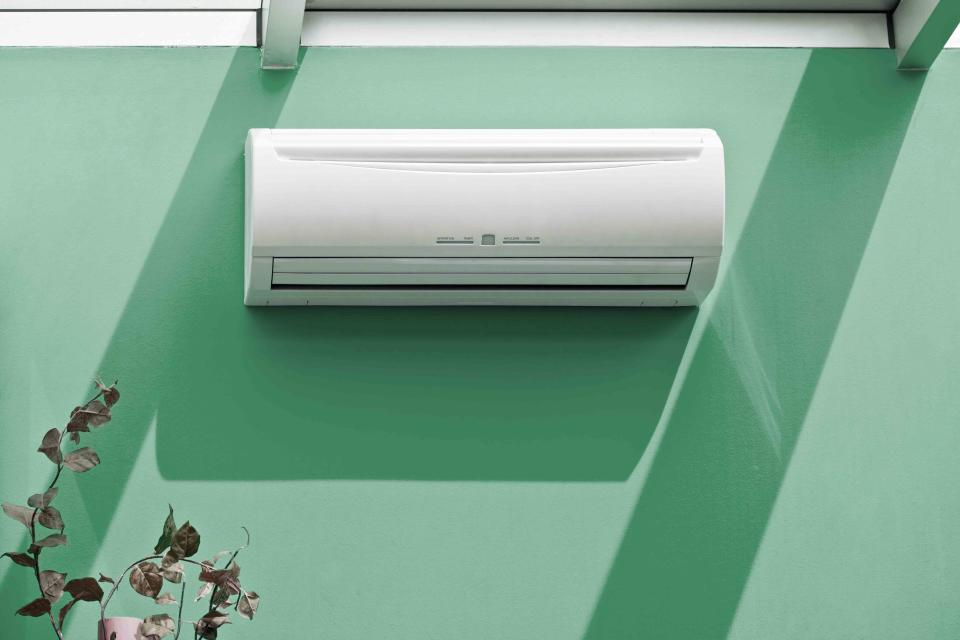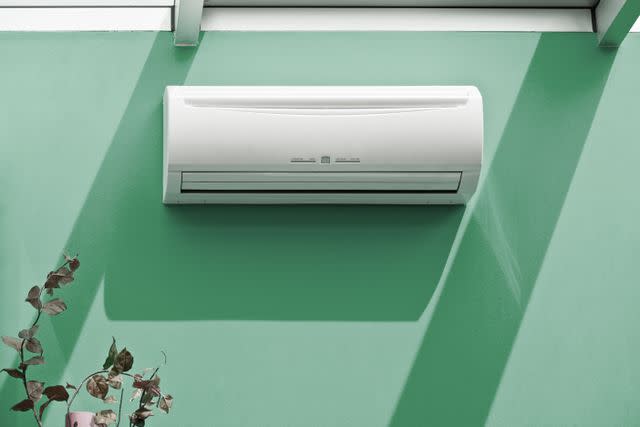Why Does My Air Conditioner Smell?
If you're asking yourself this, we can help clear the air.

Mbbirdy/Getty Images
Air conditioners blast lots of cold air into a room when it feels like it’s a billion degrees outside, and we love them for that. But sometimes they also blast lots of bad smells into a room, which we don’t love. There are so many different kinds of odors too, and the cause and fix for each can really vary. We asked two HVAC technicians for their best tips on how to handle the most common types of stink.
Related: The 9 Best Window Air Conditioners of 2023

Mbbirdy/Getty Images
Common Air Conditioner Smells and Causes
Rotten Eggs
According to Josh Mitchell, HVAC technician and founder of AirConditionerLab, this could mean there’s a natural gas leak in nearby gas-powered appliances that’s leaking into the air intake. This is a serious concern and requires immediate attention. Immediate evacuation and contacting both the gas company and an HVAC professional. This requires professional attention due to the hazard involved.
Sweaty Feet or Dirty Socks
This smell often arises from a clogged or dirty evaporator coil. “Moisture and dust on the coil create a breeding ground for these organisms,” says Ben Green, CEO of Green Leaf Air. Cleaning the evaporator coil with a coil cleaner and treating it with an antimicrobial agent can eliminate the odor.
Exhaust Fumes
“This odor, reminiscent of car exhaust, could come from fluids used within the AC unit leaking and overheating,” Josh says. It can happen if internal mechanical parts become worn out. Inspect for leaks in internal mechanical parts and replace any damaged components. A technician can help identify the exact issue.
Musty Odors
This odor is usually due to mold or mildew growth in the ductwork or on the cooling coils. “Damp conditions or poor ventilation can promote mold growth,” Ben explains. Cleaning and sanitizing the ductwork and applying an antimicrobial treatment will usually resolve this issue. Professional duct cleaning might be necessary.
Burning or Gunpowder
This could be indicative of overheated electrical components within the unit or a short circuit. This is a serious issue and warrants immediate professional inspection. Turn off the unit and contact a professional to inspect for any electrical faults, such as overheating or short circuits. This is not something that can be fixed without professional expertise, Josh cautions.
Chemical Smells
If you detect a sharp, chemical-like odor, it could be due to a refrigerant leak. Refrigerant is a chemical used in the cooling process, and its leak should be addressed by a professional. (Though Josh points out it could also be something as simple as cleaning product residue that has a lingering scent.) Contact an HVAC technician to locate the leak and repair it. Handling refrigerants requires specialized training and equipment.
Decaying Matter
If it smells like decaying matter… it probably is. Unpleasant smells of decay could be due to small animals or insects that have died inside the ductwork or other parts of the AC system. Removing the decaying matter, cleaning, and sanitizing the affected area will usually resolve this issue. This might be a task for a professional if the matter is deep within the system.
How to Prevent Air Conditioner Odors
Regular Maintenance: Keeping up with routine maintenance, such as cleaning coils, replacing filters, and inspecting the overall system, will prevent many odor-related issues.
Clean and Replace Filters Regularly: Filters should be cleaned or replaced as per the manufacturer’s recommendations. Dirty filters can cause musty odors.
Drain Pan Cleaning: If there’s a stagnant water smell, ensure the drain pan is clean and the drain line is clear of obstructions to prevent water buildup.
Proper Ventilation: Make sure that air intakes are positioned away from areas where unpleasant odors may originate, such as smoking areas or kitchens.
Use Mild Cleaners: If cleaning the system yourself, use mild, non-chemical cleaners to avoid lingering chemical smells.
Professional Duct Cleaning: If there's a persistent musty or moldy smell, consider professional duct cleaning to eliminate any mold or bacteria within the ductwork.
Inspect for Leaks and Seal Ducts: Check ductwork for any leaks that might pull in odors from other areas and seal them properly.
Avoid Smoking Near the Unit: If cigarette smoke is a problem, make sure no one smokes near the air intake areas.
Utilize Air Purifiers: Sometimes, using an air purifier in conjunction with the AC system can help eliminate odors.
Related: How to Clean an Air Conditioner
For more Real Simple news, make sure to sign up for our newsletter!
Read the original article on Real Simple.

